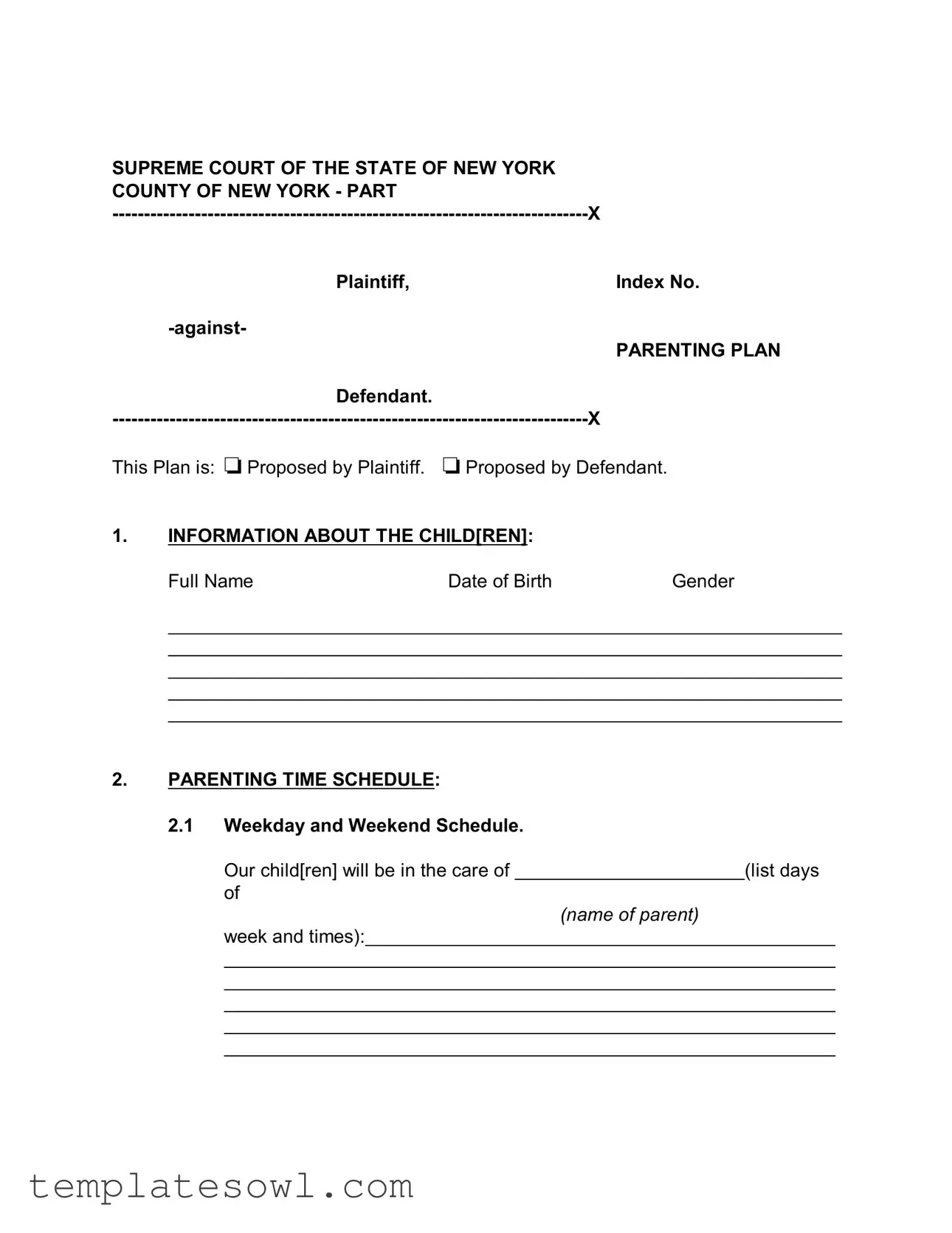Fill Out Your New York Parenting Plan Form
The New York Parenting Plan form serves as a crucial framework for parents navigating the complexities of co-parenting arrangements following a separation or divorce. As part of this formal document, a comprehensive parenting time schedule is outlined, detailing when and where each parent will care for the child or children involved. This includes not only the typical weekday and weekend routines but also specific provisions for summer schedules and holidays. For instance, the form offers parents options to agree on how holidays like Thanksgiving or Christmas will be shared, ensuring that each parent has the opportunity to spend meaningful time with their children during significant occasions. Furthermore, the plan emphasizes the importance of coordination, as it allows parents to clearly specify the care arrangement for their children's birthdays and school breaks. By detailing each parent’s responsibilities and time allocation, the form aims to promote consistency and stability in the child's life, while also providing a collaborative approach to co-parenting. Understanding how to effectively use this form can greatly benefit parents in creating a balanced and supportive parenting environment for their children, ultimately fostering their well-being as they adjust to changes in family dynamics.
New York Parenting Plan Example
SUPREME COURT OF THE STATE OF NEW YORK
COUNTY OF NEW YORK - PART
X |
|
Plaintiff, |
Index No. |
PARENTING PLAN
Defendant.
This Plan is: Proposed by Plaintiff. Proposed by Defendant.
1.INFORMATION ABOUT THE CHILD[REN]:
Full Name |
Date of Birth |
Gender |
|
|
|
|
|
|
|
|
|
|
|
|
|
|
|
2.PARENTING TIME SCHEDULE:
2.1Weekday and Weekend Schedule.
Our child[ren] will be in the care of |
|
(list days |
||
of |
(name of parent) |
|||
week and times): |
||||
|
|
|||
|
|
|
|
|
|
|
|
|
|
|
|
|
|
|
|
|
|
|
|
|
|
|
|
|

Our child[ren] will be in the care of |
|
(list |
days
(other parent’s name)
of week and times):
2.2Summer Schedule.
Choose One:
The schedule described above in Section 2.1 will continue throughout the summer except that
OR
The schedule for time with our child[ren] will be different during the summer than it is in the winter (describe below):
Our child[ren] will be in the care of |
|
(list |
(name of parent)
days of the week and times):
AND
Our child[ren] will be in care of |
|
(list days |
(other parent’s name)
of the week and times):
PARENTING PLAN REV 6/13 |
page 2. |
2.3Holiday Schedule.
The following holiday schedule will take priority over the regular weekday, weekend, and summer schedules discussed above. If a holiday is not specified as even, odd or every year with one parent, then our child[ren] will remain with the parent they are normally scheduled to be with.
Check One or Both:
When parents are using an alternating weekend plan and the holiday schedule would result in one parent having the child[ren] for three weekends in a row, the alternating weekend pattern will restart, so neither parent will go without having the child[ren] for more than two weekends in a row.
If a parent has our child[ren] on a weekend with an unspecified holiday or
Fill in the blanks below with the parent’s name to indicate where the child[ren] will be for the holidays. Provide beginning and ending times.
Holidays |
Even Years |
|
Odd Years Every Year |
Beginning/Ending Times |
|||||
Mother’s Day |
|
|
|
|
|
|
|
|
|
Father’s Day |
|
|
|
|
|
|
|
|
|
Thanksgiving |
|
|
|
|
|
|
|
For Thanksgiving, |
|
Christmas Eve |
|
|
|
|
|
|
|
Christmas Eve, |
|
|
|
|
|
|
|
|
Christmas, New |
||
Christmas |
|
|
|
|
|
|
|
Year’s Eve, and |
|
|
|
|
|
|
|
|
New Year’s, PROVIDE |
||
New Year’s Eve |
|
|
|
|
|
|
|
ADDITIONAL DETAILS |
|
|
|
|
|
|
|
|
BELOW in SECTIONS |
||
New Year’s |
|
|
|
|
|
|
|
2.4 and 2.5 |
|
|
|
|
|
|
|
|
|
|
|
Martin Luther |
|
|
|
|
|
|
|
|
|
King Day |
|
|
|
|
|
|
|
|
|
President’s Day |
|
|
|
|
|
|
|
|
|
PARENTING PLAN REV 6/13 |
page 3. |

Easter
Memorial Day
Fourth of July
Labor Day
Halloween
Veteran’s Day
Other:
2.4Thanksgiving. Details for sharing time with the child[ren] during this holiday are:
2.5Winter Break (Christmas, New Year’s, and School Vacation).
Choose One:
Our child[ren] will be in the care of each parent according to the schedule described in Section 2.1.
OR
Our child[ren] will spend half of Winter Break with each parent on a schedule that is consistent with the alternating holidays described above.
OR
Other: Details for sharing time with the child[ren] during Christmas Eve, Christmas Day, New Year’s Eve and New Year’s Day and school vacation are:
PARENTING PLAN REV 6/13 |
page 4. |

2.6Spring Break.
Choose One:
Our child[ren] will be in the care of each parent according to the schedule described in Section 2.1.
OR
Our child[ren] will alternate spending spring break with each parent (indicate which parent).
With
With
OR
Our child[ren] will spend half of spring break with each parent (provide details):
2.7Child[ren]’s Birthdays. Choose One:
Our child[ren] will be in the care of each parent according to the schedule described in Sections 2.1 and 2.2.
OR
Our child[ren]’s birthdays will be planned so that both parents participate in the birthday celebration.
OR
PARENTING PLAN REV 6/13 |
page 5. |

Our child[ren] will celebrate birthdays according to the following plan (indicate which parent has the child[ren], and any other important details.:
2.8Other Holiday and Vacations. Details for sharing time with the child[ren] during other holidays or vacation are:
2.9Number of Overnights.
Our schedule for sharing time with our child[ren] results in our child[ren]
spending |
|
|
overnights in the home of |
|
(name of |
|||
one parent) and |
|
|
overnights in the home of |
|
|
|
||
(name of other parent). |
|
|
||||||
2.10Primary Residence (Optional).
We agree that our child[ren] shall primarily reside with (name of one parent).
We agree that neither residence shall be considered the “primary” residence.”
2.11Alternate Care (Optional).
We choose not to specify arrangements for alternate care.
Our arrangements for alternate care are:
PARENTING PLAN REV 6/13 |
page 6. |

2.12Temporary Changes to the Schedule.
Any schedule for sharing time with our child[ren] may be changed as long as both parents agree to the changes ahead of time in writing OR
verbally (choose one).
Activities scheduled during the other parent’s time must be coordinated with the other parent.
Makeup and Missed Parenting Time: Only substantial medical reasons will be considered sufficient for postponement of parenting time. If a child is ill and unable to spend time with a parent, a makeup parenting time will be scheduled. If a parent fails to have the child[ren] during their scheduled parenting time for any other reason, there will be no makeup of parenting time unless the parties agree otherwise in writing.
2.13Permanent Changes to the Schedule.
We understand that, once the judge signs the final judgment in our case and approves this Parenting Plan, any changes that we do not agree on can be made only by applying to the court and proving that there has been a “change in circumstance.”
Before applying to the court, we understand that we can agree to try to resolve our dispute through mediation or other means.
3.
3.1
Each parent will make
3.2.Major Decisions.
PARENTING PLAN REV 6/13 |
page 7. |

Major decisions include, but are not limited to, decisions about our child[ren]’s education,
Choose One: |
|
|
(parent’s name) shall have sole |
OR
Both parents will share in the responsibility for making major decisions about our child[ren]. This arrangement is known by the courts as Joint Custody.
AND |
(Choose One). |
||
|
|
|
(Parent’s name) shall always consult with the |
other parent prior to making major decisions. |
|||
|
|
|
(Parent’s name) shall have the option to consult |
with the other parent prior to making major decisions.
OR
Other - - Describe how major decisions will be handled; including dividing the responsibility for major decisions between the parents according to each parent’s strengths/weaknesses:
4.INFORMATION SHARING:
Unless there is court order stating otherwise:
Both parents are entitled to important information regarding our child[ren]
PARENTING PLAN REV 6/13 |
page 8. |

including but not limited to, our child[ren]’s current address and telephone number, education, medical, governmental agency, psychological and law enforcement records.
Information about our child[ren]’s progress in school and any school activity is equally available to both parents. Both parents are encouraged to consult with school staff concerning our child[ren]’s welfare and education.
Both parents will immediately notify each other regarding any emergency circumstances or substantial changes in the health of our child[ren].
Both parents will provide each other with contact numbers and addresses and will notify each other of any change in that information within 72 hours of such a change. If either parent takes our child[ren] from their usual place of residence, they will provide the other parent with an emergency contact phone number.
5.RELOCATION OF A PARENT:
5.1Neither parent shall relocate outside his/her immediate vicinity without the prior permission of the other parent or an order of the court.
5.2Other:
6.
Choose One:
Both parents and child[ren] shall have the right to communicate by telephone, in writing or by
OR
PARENTING PLAN REV 6/13 |
page 9. |

Procedures for telephone, written or
7.EXCHANGE OF OUR CHILD[REN]:
7.1 Choose One:
Both parents will share equally in the responsibility of exchanging our child[ren] from one parent to the other while parents continue to reside in the same locale.
OR
Procedures for exchanging our child[ren] (provide details):
7.2Both parents shall have the child[ren] ready on time with sufficient clothing packed and ready at the
All clothing that accompanied our child[ren] shall be returned to the other parent.
8.MUTUAL RESPECT:
Parents will not say things or knowingly allow others to say things in the presence of our child[ren] that would take away our child[ren]’s love and respect for the other parent.
9.OTHER TERMS:
Add any other items regarding the child[ren] you would like to include in your
PARENTING PLAN REV 6/13 |
page 10. |
Form Characteristics
| Fact Name | Description |
|---|---|
| Governing Law | The Parenting Plan in New York is governed by the New York Domestic Relations Law. |
| Purpose | The Parenting Plan serves to outline the child custody and visitation arrangements for parents following separation or divorce. |
| Children's Information | The form requires full names, dates of birth, and genders of the children involved. |
| Care Schedule | A detailed schedule for parenting time must be provided, outlining which parent has the child(ren) on specific days. |
| Holiday Arrangements | The Parenting Plan includes a section for specifying holiday schedules and how they take priority over regular schedules. |
| Summer Schedule | Parents can choose to maintain a regular schedule or create a different arrangement for summer parenting time. |
| Child’s Birthdays | Options regarding the child's birthday celebrations help ensure both parents participate, fostering a positive environment. |
| Flexibility | The Parenting Plan allows for adjustments based on the needs of the child and the parents' preferences. |
| Review and Updates | It is advisable for parents to revisit the Parenting Plan periodically, making necessary updates to reflect changes in circumstances. |
Guidelines on Utilizing New York Parenting Plan
Completing the New York Parenting Plan form is an essential step in outlining how custody and visitation will be managed for your child or children. This plan serves as a way to clearly define each parent's responsibilities and the time the children will spend with each parent. Below are detailed steps to help you fill out the form correctly.
- Choose the Plan Type: Indicate whether the plan is proposed by the Plaintiff or Defendant by checking the appropriate box at the top of the form.
- Complete Information About the Child(ren): In the section labeled "INFORMATION ABOUT THE CHILD(REN)," fill in the full names, dates of birth, and genders of your child or children.
- Determine Parenting Time Schedule: In "PARENTING TIME SCHEDULE," specify the care schedule.
- Weekday and Weekend Schedule: List the days and times each parent will care for the child(ren).
- Summer Schedule: Choose whether the regular schedule applies during summer or if it will differ. If it varies, describe the new schedule, providing specific days and times for each parent.
- Establish Holiday Schedule: Detail the holiday arrangement, prioritizing holidays over the regular schedule.
- Specify how holidays will be shared and provide beginning and ending times for each holiday.
- Check off if any special arrangements apply regarding alternating weekends during holidays.
- Detail Specific Holidays: In sections 2.4 for Thanksgiving and 2.5 for Winter Break, clearly outline the plans for how time will be shared during these periods.
- Fill Out Spring Break and Birthdays: Choose how spring break will be shared, noting if it will alternate or if each parent will get half. Also, decide how your child(ren)’s birthdays will be planned to ensure participation from both parents.
- Review and Finalize: Carefully review the information you have provided to ensure accuracy. Make any necessary edits before submitting the form.
After filling out the form, you will need to submit it to the appropriate court for approval. Be sure to keep copies of all documents for your records and to help facilitate any further discussions or negotiations regarding your parenting plan.
What You Should Know About This Form
What is a New York Parenting Plan form?
The New York Parenting Plan form is a legal document used by parents in custody and parenting disputes. It helps establish a formal agreement regarding the care and parenting arrangements for their children. This plan includes essential details about custody schedules, holiday arrangements, and parenting responsibilities. It ensures both parents are on the same page about how they will co-parent their child(ren) moving forward.
Who needs to fill out the Parenting Plan form?
Both parents involved in a custody dispute are encouraged to fill out the Parenting Plan form. This includes any parent who is seeking a legal designation of custody or modifying an existing arrangement. The form allows parents to outline their proposed plan for child care, visitation schedules, and how they will share holidays and significant events in their child(ren)’s lives.
What information is required about the child(ren)?
The form asks for basic information about each child, including their full name, date of birth, and gender. This information helps provide clarity and specificity within the Parenting Plan, ensuring that all parties understand which child(ren) are included in the agreement.
How is the parenting time schedule structured?
The Parenting Plan form outlines a parenting time schedule to detail when each parent will be responsible for their child(ren). It includes sections for weekday and weekend schedules, summer time arrangements, and parental rights during holidays. Parents must fill in the specific days and times for each parent’s custody, making it clear who will take care of the child(ren) at any given time.
Are holiday schedules important in the Parenting Plan?
Yes, holiday schedules are crucial. The Parenting Plan specifies how holidays will be divided between parents and provides guidelines for sharing special occasions, such as birthdays and traditional holidays like Thanksgiving and Christmas. It helps prevent confusion and ensures that the child(ren) spend meaningful time with both parents during important times of the year.
Can the Parenting Plan be modified after it is filed?
Yes, the Parenting Plan can be modified after filing. Life circumstances may change over time, and so can parenting needs. If both parents agree to changes in the plan, they can submit a modification request to the court. It's always best to have any amendments documented to avoid misunderstandings in the future.
What happens if one parent does not follow the Parenting Plan?
If one parent does not adhere to the agreed-upon Parenting Plan, the other parent can seek legal enforcement. This might involve filing a motion with the court to address the non-compliance. Courts take these matters seriously as they are centered around the best interests of the child(ren).
Is it necessary to have a lawyer to complete the Parenting Plan form?
While having a lawyer is not strictly necessary, it is advisable. A family law attorney can help clarify complex issues, explain rights and responsibilities, and ensure that the form complies with legal standards. Parents can also choose to complete it independently, but consulting with a professional may be beneficial for peace of mind.
Where can I obtain the New York Parenting Plan form?
The New York Parenting Plan form can typically be obtained from the New York State Unified Court System's website or your local family court. It's crucial to ensure you are using the most recent version of the form to avoid any legal issues.
Common mistakes
Filling out the New York Parenting Plan form can be a daunting task, often leading to missteps that could impact parenting arrangements. One common mistake is neglecting to accurately list all relevant information about the child or children. Essential details such as full names, dates of birth, and gender should be provided without omission. Incorrect or incomplete information can cause confusion and delays in the court’s processing of the plan.
Another frequent issue arises when parents fail to establish a clear and consistent parenting time schedule. It's crucial to specify the exact days of the week and times when the child will be with each parent. Ambiguities can lead to misunderstandings, resulting in conflicts over custody arrangements. For instance, stating "I want to see my child" without specific details doesn't provide a comprehensive plan. Instead, a clear outline of communication can help both parents and the child feel secure.
Parents often overlook the summer schedule when filling out the form. It's not sufficient to default to the regular school-year arrangement. Specifying changes during the summer months is important, as children’s needs might differ when school is not in session. A detailed explanation of the plan during summer helps make transitions smoother for everyone involved.
When addressing holiday schedules, a mistake made by many is failing to prioritize the holiday plan over regular schedules. If conflicting schedules arise because of holidays, it’s essential to clarify which plan takes precedence. This includes indicating when and where the child will be during specific holidays, as this prevents last-minute disputes and promotes better communication.
In addition, some parents neglect to include necessary details about sharing time during significant holidays like Thanksgiving or Christmas. Simply stating that one parent will have the child or that they will alternate may not be enough. Providing specific times and expectations will avoid misunderstandings and create a more cooperative environment.
It’s not uncommon for parents to forget about their children’s birthdays when drafting the parenting plan. Parents need to clarify how they intend to celebrate these special days together. Failure to address birthday arrangements might lead to frustration and feelings of exclusion for one parent, impacting the overall co-parenting relationship.
Finally, one of the most significant mistakes is failing to review the completed form thoroughly before submission. This step is vital to catch any inaccuracies or omissions that could affect the court's decisions. Taking the time to double-check the details ensures clarity and enhances the likelihood of a smooth approval process. Remember that this plan is designed to serve the best interests of the child, and thoughtful preparation can make a profound difference.
Documents used along the form
When creating a comprehensive approach to parenting, several forms and documents may complement the New York Parenting Plan form. Each of these documents serves a specific purpose in setting out agreements and ensuring clarity in co-parenting arrangements. Here’s a list of commonly used forms:
- Child Support Agreement: This document outlines the financial responsibilities of each parent, including the amount of support, payment frequency, and additional expenses related to the child.
- Visitation Schedule: A detailed timetable specifying when each parent will spend time with the child, supplementing the parenting plan to ensure both parents have clear expectations.
- Divorce Decree: The final order from a court that formalizes the divorce and includes custody, support, and visitation arrangements agreed upon by both parents.
- Notification of Change of Address: A form that ensures both parents inform each other about significant changes in residence, as it may impact visitation and parenting plans.
- Parent Communication Log: This tool helps document interactions and communications between parents regarding the child’s needs, emergencies, and updates. It supports transparency and accountability.
- Medical Authorization Form: This document grants permission for one parent to make medical decisions for the child or to obtain medical care when the child is in their custody.
- Child Care Agreement: A written understanding between parents outlining responsibilities for child care, including babysitters, daycare, and school arrangements.
- Emergency Contact Form: This form provides critical information regarding the child’s daily care providers and emergency contacts, ensuring both parents are informed.
- Mediation Agreement: If parents have disputes, this document summarizes the results of mediation sessions concerning parenting arrangements, fostering a collaborative approach to conflict resolution.
- Parenting Education Course Completion Certificate: Some courts may require proof that parents have completed a course on effective co-parenting and conflict resolution strategies.
Understanding these documents and their purposes is vital for creating a stable and cooperative environment for children. Clarity and communication foster healthier co-parenting relationships and ensure that the best interests of the child remain the primary focus.
Similar forms
Custody Agreement: Similar to the New York Parenting Plan, a custody agreement outlines the arrangement for custodial care and visitation rights for both parents, ensuring both have a clear understanding of their roles and responsibilities regarding their child’s upbringing.
Child Support Agreement: While the Parenting Plan focuses on time-sharing, this document details financial obligations for the child’s support, often reflecting the parenting time outlined in the Parenting Plan.
Visitation Schedule: This document specifies the times and conditions under which a non-custodial parent can visit their child, presenting a detailed account similar to the Parenting Plan’s time schedule.
Co-Parenting Plan: Designed to aid parents in working together post-divorce or separation, this plan addresses communication, decision-making, and conflict resolution, paralleling some of the objectives within the Parenting Plan.
Joint Custody Agreement: This agreement outlines how both parents share custody responsibilities and parenting time, echoing aspects of the Parenting Plan's scheduling provisions.
Separation Agreement: This broader legal document may cover various aspects of a couple's separation, including child custody, division of assets, and support, similar to the comprehensive nature of the Parenting Plan.
Family Law Mediation Agreement: This document can serve as a resolution tool for disputes, detailing the agreed-upon parenting arrangements similar to those found in the Parenting Plan.
Child Custody Evaluation Report: Often used in court proceedings, this report assesses the best interests of the child, guiding custody arrangements, much like the Parenting Plan aims to protect the child’s welfare.
Travel Consent Form: For shared custody situations, this form facilitates travel arrangements for the child and ensures both parents agree to changes in scheduled custody, thereby supporting the Parenting Plan's emphasis on clear communication.
Modification Petition: Should circumstances change, this document requests alterations to the existing parenting plan, similar to how the Parenting Plan itself may need adjustments over time to reflect the child’s evolving needs.
Dos and Don'ts
When completing the New York Parenting Plan form, there are important guidelines to follow to ensure clarity and compliance. Here are four key do's and don'ts to keep in mind:
- Do provide accurate information: Ensure that you fill in the full name, date of birth, and gender of your child(ren) correctly. This information is crucial for the court's understanding of your family situation.
- Do detail the parenting schedule: Clearly outline the days and times each parent will be responsible for the child(ren). Ambiguities in scheduling can lead to conflicts down the line.
- Don't forget to consider the holidays: Address how parenting time will be divided during holidays. Be specific about which parent will have the child(ren) for each holiday.
- Don't leave sections blank: Complete all sections thoroughly. Missing information can delay the approval of your parenting plan and may lead to complications in custody arrangements.
By adhering to these principles, you can create a more effective and clear parenting plan that benefits both you and your child(ren).
Misconceptions
Understanding the New York Parenting Plan form can be challenging, leading to several misconceptions. Here are five common misunderstandings about this form:
- Misconception 1: The Parenting Plan is only for court use.
- Misconception 2: The form must be complicated or lengthy.
- Misconception 3: Both parents must agree on every item in the form.
- Misconception 4: The Parenting Plan is permanent.
- Misconception 5: An attorney is needed to complete the Parenting Plan.
Many people believe that the Parenting Plan is needed only when heading to court. In reality, it also serves as a practical tool for parents to outline their agreement regarding their children's care.
Some assume that a comprehensive parenting plan needs to cover every detail about the child’s life. However, the Parenting Plan is designed to be straightforward and can be as detailed as parents feel necessary.
While it is ideal for parents to reach a consensus, it is not mandatory for all items. Parents can fill out sections based on their individual needs and negotiate later as necessary.
Many think that once a Parenting Plan is approved, it cannot be changed. This is not true; as children grow and circumstances change, parents can modify the plan to better meet their family's needs.
While legal advice can be helpful, it is not required to fill out the Parenting Plan form. Parents can rely on the form itself to create a practical schedule for their children.
Key takeaways
When completing the New York Parenting Plan form, consider the following key takeaways:
- Provide Accurate Information: Ensure all details about your child, such as full name, date of birth, and gender, are filled out correctly.
- Outline Parenting Time: Clearly define the weekday and weekend schedules, specifying which parent will care for the child on each day.
- Address Holidays: Include a comprehensive holiday schedule that prioritizes the well-being of the child and outlines where they will spend each holiday.
- Include Summer Plans: Determine if the parenting time schedule changes during summer and specify the new arrangements as needed.
- Plan for Special Occasions: Decide how to handle birthdays and other significant events, ensuring both parents have the opportunity to participate.
Browse Other Templates
Distributor Registration Application,Mutual Fund Distributor Enrollment Form,Empanelment Application for Distributors,Mutual Fund Partnership Registration,Distributor Credentialing Form,Investment Distributor Application,Mutual Fund Sales Partner For - List key employees in your organization, along with their email ID for communication.
How Do I Get My Transcript - This form serves as your official transcript request document.
Trampoline Arena Participant Waiver,Airheads Liability Release Form,Trampoline Activity Agreement,Airheads Safety and Risk Acknowledgment,Trampolining Participation Agreement,Airheads Risk Acceptance Form,Trampoline Arena Waiver of Liability,Airheads - The form specifies that all claims must be filed in Pinellas County, Florida.
